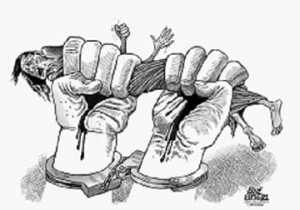Trafficking kills

Then comes the offer of a pimp to make easy money.
Trying to understand her misery, she laments: “So different now from what it seemed… Now life has killed the dream I dreamed.”
And then predators come to ravish her.
“Come on, Captain, you can wear your shoes! Don’t it make a change to have a girl who can refuse? Easy money, lying on a bed… Just as well they never see the hate that’s in your head! Don’t they know they’re making love to one already dead?”
She is Fantine, a character in Victor Hugo’s 1852 social commentary Les Miserables, played in the latest screen adaptation by Anne Hathaway.
Article continues after this advertisementToday’s battle against the flesh trade has shifted from going after the prostituted women to addressing the system of exploitation – human trafficking.
Article continues after this advertisementHuman trafficking has been integrated in international law through agreements like the United Nations Protocol to Prevent, Suppress, and Punish Trafficking in Persons, Especially Women and Children.
In the Philippines, the Anti-Trafficking in Persons Act of 2003 (Republic Act 9208), and amended by RA 10364 or the Expanded Anti-Trafficking in Persons Act of 2012 includes prostitution as an act of trafficking.
Last Wednesday’s conviction of Valentino Martin for human trafficking for operating the brothel – Gate 3 – in barangay Banilad in Cebu is a resounding blow to the illegal trade.
Martin faces imprisonment of 20 years.
This is not the first time that Regional Trial Court Judge Simeon Dumdum let the axe fall on human traffickers. In March last year, he sentenced two pimps to life imprisonment.
In that decision, the judge weighed the “bruteness” of the anti-human trafficking law against “the pitiful condition of the accused.”
Like many sent to our squalid penal institutions, Martin and others convicted of human trafficking may not fully understand what hit them.
The severe penalty is a strong message that justice will not look the other way despite society’s seeming apathy to the operation of red houses in neighborhoods and bars that are fronts for offering sexual services of women and girls.
The flesh trade is slavery that debases the humanity of its victims.
For that reason alone, the full weight of the law should be brought to bear on those who profit from it.